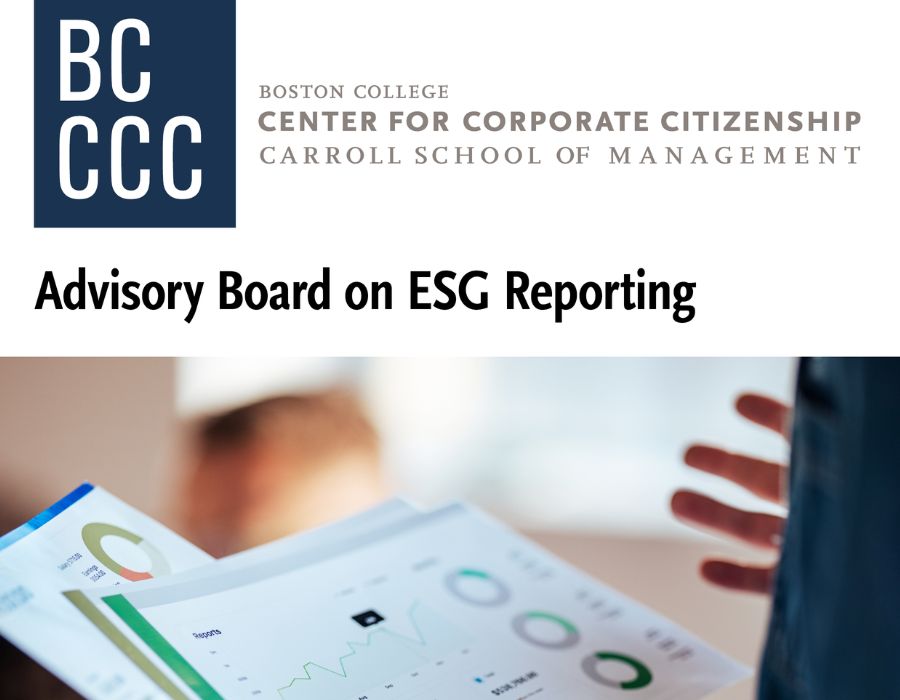Disclosure | ESG Reporting
ESG reporting, also known as non-financial disclosure or sustainability reporting, involves the transparent disclosure of a company's performance and initiatives related to environmental, social, and governance factors. It goes beyond traditional financial reporting to provide stakeholders with a comprehensive view of a company's overall impact and commitment to responsible and sustainable practices.
Access to more in-depth content is available to BCCCC members.
Catch Up on the Latest Research in ESG Reporting & Disclosure

Takeaway: Comprehensive ESG disclosure significantly increases the likelihood of an EU listed company’s strong ESG and stock performance.
Researchers collected ESG disclosure, ESG performance, and financial information for over 450 publicly traded companies in the EU from 2010 to 2018. They examined how ESG disclosure affects both sustainability and financial performance...
Executives love stories and they need facts. Delivered twice monthly, this series of research studies can help you create the best business case for your programs. If your company is a member, you have access to hundreds of these program-defining studies. Simply log in to browse them. If your company is not yet a member, ask us about joining!
WATCH: The Latest Videos on ESG & Sustainability Reporting
BCCCC maintains a robust video library on CSR and ESG topics like corporate community involvement. Most of these videos—including main stage sessions from our annual Conference and monthly webinar recordings—are available to BCCCC members only. Enjoy this brief clip as a sample of our video library.
WEBINAR CLIP: Navigating the CSRD Omnibus
This clip offers insights from Matt Blakely, VP of Corporate Social Responsibility & Sustainability at Reinsurance Group of America, on how his company has structured their Sustainabilty Reporting team to best accomodate the changing CSRD requirements.
Member Voices | ESG Reporting/Disclosure

Liberty Mutual Insurance
EVP & Chief Sustainability Officer
"Our board discussions have underscored the importance of creating robust data management systems that adapt to shifting requirements while maintaining the integrity of sustainability information. Additionally, in our discussions, cross-functional collaboration has emerged as an essential success factor because sustainability cannot thrive in isolation. It requires partnership across departments – from legal and marketing to operations and client services."
DISCUSS: Opportunities to Engage with ESG Reporting Peers
Our roots in one of world's leading business schools is one advantage we can offer the corporate citizenship community. Our membership—comprised of 10,000+ professionals from companies around the world—is another. Executives come to BCCCC for opportunities to discuss, share, ideate, collaborate... We offer a variety of formats and forums for this purpose. Please note that all of the following discussion venues, not including our annual Conference, are exclusively available to BCCCC members. We welcome you to learn more about each one, and ask about membership for your company.
ESG Reporting & Disclosure 101: Basic Questions & Concepts
ESG (Environmental, Social, and Governance) reporting involves disclosing a company's performance and progress on sustainability and ethical practices. This transparency helps stakeholders, including investors, customers, and regulators, assess a company's long-term value and commitment to responsible operations. Effective ESG reporting can enhance corporate reputation, build consumer confidence, and improve risk management.
Companies can utilize various frameworks to structure their ESG disclosures, such as the Global Reporting Initiative (GRI), Sustainability Accounting Standards Board (SASB), Task Force on Climate-related Financial Disclosures (TCFD), and the International Integrated Reporting Council (IIRC) Framework. These frameworks provide guidelines for reporting on material environmental, social, and economic performance and impacts.
The regulatory environment for ESG reporting is rapidly changing. In the U.S., the Securities and Exchange Commission (SEC) has introduced rules requiring public companies to disclose climate-related risks and greenhouse gas emissions in their annual reports. Internationally, the European Union's Corporate Sustainability Reporting Directive (CSRD) mandates detailed ESG disclosures for a broad range of companies, including non-EU companies with significant EU operations.
Companies often encounter challenges such as navigating multiple reporting standards, ensuring data accuracy, and addressing stakeholder expectations. Additionally, political polarization around ESG topics can complicate disclosure strategies. Engaging internal stakeholders and staying informed about regulatory developments are crucial for effective ESG reporting.
To prepare, companies should start by assessing their current ESG practices and identifying gaps in data collection and reporting. Utilizing established frameworks can provide structure and comparability. Engaging with advisory boards, such as BCCCC's ESG Reporting Advisory Board, can offer insights into best practices and emerging trends.

FEATURED ARTICLE
PATHWAYS TOWARD A MORE SUSTAINABLE FUTURE
With sustainability now a business imperative, learn more about how GM and Flex are making efforts at local and global levels in circularity and waste reduction.
Recommended Reading on ESG Reporting & Disclosure
Would you like to access one or more of the members-only benefits on this page? Ask us about membership! Once you join, BCCCC benefits extend to everyone at your company.
LEARN: Grow Your Non-Financial Disclosure Knowledge
BCCCC aims to help corporate citizenship professionals know more, do more, and achieve more. Learning is a key piece of what we offer. And because we are housed in Boston College's prestigious Carroll School of Management, you can trust we are well-positioned to help you grow your knowledge—whether you choose to take a course, earn your certificate, or simply read our latest articles on environmental sustainability.
Take a Course
BCCCC offers nearly two dozen self-paced, online courses, including Reporting Aligned with the CSRD and Fundamentals of Sustainability Reporting. Browse all our online course options.
Earn Your Certificate
BCCCC's Sustainability Reporting certificate is a globally recognized credential in the field. We also offer more general certification in all dimensions of corporate citizenship, management, and leadership.
Join the Center
Some of our best learning opportunities (research, conversations with other sustainability professionals, webinars, etc.) is reserved for our members. Ask us about membership for your company!
Bundle and Save
Did you know you can combine your membership with add-ons like online courses, in-person learning, or team training?





